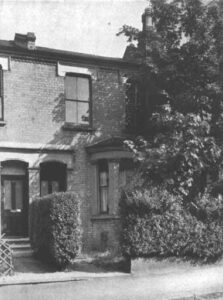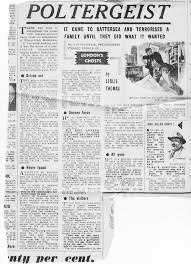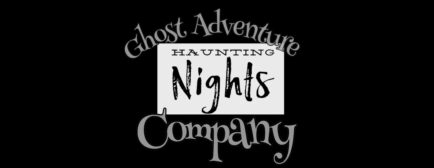The BBC have just released a new podcast about the case so Haunting Nights wanted to take a deeper look!
If you were driving through south London’s Battersea borough you would miss them. Standing shoulder-to-shoulder, brick to brick, are the houses on the Eland and Wycliffe Road . As they stand and once stood. Two quintessential south London two-story brick and mortar affair. However unlike many of their neighbours, both of these houses in Battersea harbour a darker past. One which still lingers in the nightmares of those unfortunate ones who remember. What follows are the true accounts of the strange and frightening case of the Battersea Poltergeist .

In November 1927 loud bangs startled the family named The Robinsons. The sounds of glass breaking and loud bangs were heard coming from the outside. Frederick, the 26 year-old son of home owner Henry went to to have a look. He found that pieces of coal were falling down on top of the conservatory, breaking the glass roof. Frederick notices that along with the lumps and pieces of coal were some old coins. Pennies. Many days past and the mysterious showers rained down on the battered shed and no one could find the source. Frederick alongside his sisters Kate, Lillah, and the widowed Mrs. Perkins searched the whole area. All of the Robinson children searched for the pranksters that they believed were responsible for the vandalism. Peter, Mrs. Perkins’ 14 year-old son also helped. After a few days of not coming up with an explanation or pranksters, they decided to seek help from the police.
The following is an excerpt from the famous Harry Price’s book ‘Poltergeist Over London’ (1945):
Except for Percy,’ said Mr. Robinson, ‘we lived in the house for twenty-five years, happily and peacefully. Then on November 29, lumps of coal, pieces of soda and pennies began to fall on the conservatory – a lean-to building at the back of the house. It stopped for a few days. It began again early in December. It struck me as being extremely curious at the time that, although the pieces of coal were very small, they broke the glass. Things became so serious that I decided to call the police. I had no other idea except that some person was throwing things over the garden wall. A constable came along, and together we stood in the back garden and kept watch. Pieces of coal and pennies crashed on to the conservatory roof, but we could not trace their flight. One lump of coal hit the constable’s helmet. He ran to the garden wall, but there was nobody there. On December 19 our washerwoman said she would not work any longer in the house. She came to me in a state of terror and pointed to a heap of red-hot cinders in the outhouse. There was no fire near. How could they have got there? Again I called a constable, and we decided to watch in the kitchen. Two potatoes were hurled in while we were sitting there.’
‘It was on Monday that the climax came – at nine o’clock in the morning – and for an hour the family was terror-stricken. There were loud banging’s in all parts of the house. My sister ran to tell the magistrate. The window panel in my father’s bedroom was smashed, and as he was in such a state of fear I decided to remove him from the house. I called a man from the street, and together we carried him from the room. Just as we were taking him out a heavy chest of drawers crashed to the floor in his bedroom. Previously, my sister had seen the hall stand swaying and had called me. I caught it before it fell, but some strange power seemed to tear it from my hands, and it fell against the stairs, breaking in two parts.’
Mr. Bradbury, the man who was called in to help move the old gentleman, confirmed Mr. Fred. Robinson’s account. He said: ‘Mr. Robinson called me to his house, and when I arrived there at about ten o’clock there were a fishmonger and a greengrocer discussing with him what had happened. I saw several women in the house and they appeared to be very frightened. Mr. Robinson took me up to a bedroom, where he said his father had been sleeping, and showed us an overturned chest of drawers.
‘One of the women said that she was afraid to stop in the house, and that she was also afraid to go into her room to pack up her clothing. We went with her into her room, and she told us that she had been awakened by loud banging’s on the door, and the crashing of glass. We stayed there until she had packed her bag and then returned to the back bedroom, where Mr. Robinson showed us pennies and coal on the conservatory roof.
The four of us – all men – were watching these, when suddenly from another bedroom came a great crash and downstairs we heard a woman scream. We ran to the room and there we saw a chest of drawers lying on the floor. It was all very strange, and Mr. Robinson then took us to the kitchen and showed us the damage done there.’
We were so frightened that we went outside. Through the kitchen window we saw all the kitchen chairs fall over. We went upstairs and found stones on the roof. An extraordinary part about it is that the furniture seemed heavy to pick up again’. – Mrs. Perkins
At this time, Harry was listening to her story when a strange sound interrupted. Price listened carefully at the noise that apparently came from the upstairs. He recounts of the strange visit:
‘To me the noise sounded like the fall of a heavy boot or brush and I at once began to look for such an article: so did the Evening News representative (Mr Grice who accompanied Harry during the investigation). In a minute or so I saw something dark under a chair in the corner and putting my hand on it I found it was a pair of lady’s black shoes. Actually I put my hand on a hard object which was in the right shoe and brought it to light. It was a small bronze ornament in the form of a cherub, weighing about four ounces.
The cries of astonishment – real or simulated – with which the ladies greeted my ‘find’ were renewed when it was discovered that the ornament was missing from the mantlepiece of the front sitting-room, where, I was informed, it had reposed (together with its fellow cherub) for twenty-five years. We were assured that these cherubim and never been removed from the front room. I continued my search of the kitchen but could discover nothing else which could have fallen. If the bronze ornament really came from the next room it must have made two right-angled turns and travelled over our heads. It is conceivable that the ornament may have been thrown by one of the women, but I was within a few inches of both Mrs. Perkins and her sister and saw no suspicious movement on the part of either. Mr. Grice also declares that he saw nothing that could account for the flight of the ornament, which was quite cold when I picked it out of the show; if it had been held in the hand, it would, of course, have retained some of the heat.’
As abruptly as it began, the poltergeist came to an end shortly thereafter.
A series of unfortunate non-paranormal events had befallen upon the Robinson family. As the days and years passed quietly, the streets of Battersea once again claimed their respective ordinariness.
That is until 15 year-old Shirley Hitchings and her family moved into 63 Wycliffe Road. Less than a mile from the infamous Eland road house.
It started one night in 1956 when Shirley lay in bed fast asleep. In the middle of the night her bed suddenly bust into flames. Shirley leapt out on time, managing to escape the mysterious fire. The family was spooked. They searched and found no reason as to why Shirley’s bed would suddenly go up in flames. Confused, Mr. Hitchings made sure that all of the matches inside the house were thrown out. Days later they began to hear strange noises around the house. However unlike the Robinsons, the Hitchings were all of a sudden plagued by strange knockings, tapping’s, and fires throughout their home. Just as their fears began to settle a bit, another fire had broken out when an article of clothing was set on top of an electric cooker that had been inexplicably turned on.
The Hitchings tried to live a normal life but in their small community, word got around fast. Especially when the unexplained events on Eland road were fresh on the minds of many of the residents. The poltergeist activity began to follow Shirley to her job causing disruption. When strange tapping’s which sounded like ‘a metallic sound’ were heard coming from a spot above her bed, it was apparent that Shirley was the focus of the phenomena.

Soon the attacks evolved into phantom touches, pulling of bed sheets, and the levitation of Shirley whilst in bed. The paranormal activity was heard and witnessed by many who visited the Hitchings’ home. One of the visitors was a well known paranormal investigator.
Spiritualist Harry Hanks arrived at the house and quickly set up séance in efforts to get rid of the poltergeist. The séance was reported to be successful as the fires and tapping’s finally ceased. Only the phantom letters continued to be sent from the address with no one taking responsibility for them. One of these phantom letters was said to have come from Louis Capet; who was the second son of Louis XVI and Marie Antoinette. Most of the other letters were simply signed as “Donald” or “Spooky Willie”.
As Hanks continued his investigation, it was learned that Shirley had developed an unnatural relationship with her tormentor. Call it a poltergeist Stockholm syndrome or some sorts. Somehow, someway, Shirley began to communicate with Donald on a constant basis. Leading many to speculate that the ghost had possessed Shirley and used her as a conduit to send the letters. The theory made sense since some of those letters were analysed and compared to Shirley’s handwriting. The revelation of the matching scribblings casted a heavy shroud of speculation on the family, especially upon Shirley.
The poltergeist activity that resided inside the house and that hounded Shirley had finally seen to have given up. However the letters still kept being inexplicably sent out, stamped and addressed to random individuals. One of whom was said to be Lord Brazon. No one actually saw Shirley or anyone else in the residence mail out the letters, yet for three more years they continued to be mailed out as if on their own accord. One of those letters was sent to a man named Harold S.W. Chibbet. A writer for the famous Fate Magazine. Eventually many came to the conclusion that Shirley was the one mailing out the strange letters in mixed languages. However it was believed that she had done so under Donald’s spell.
Eventually the phantom letters ceased and once again the weird slowly ebbed out of the south London borough. To this day no one could explain the paranormal incidents that transpired inside the homes on Eland and Wycliffe Road. people wondered if the poltergeist slipped into a sort-of dormant state, as it had previously done from 1927 to 1956.
If that’s the case for Battersea, are we long overdue for another haunting?
The BBC have made podcast for you to have a listen too.
A paranormal cold case, re-investigated through a thrilling blend of drama and documentary. The true story of one of Britain’s strangest hauntings.


